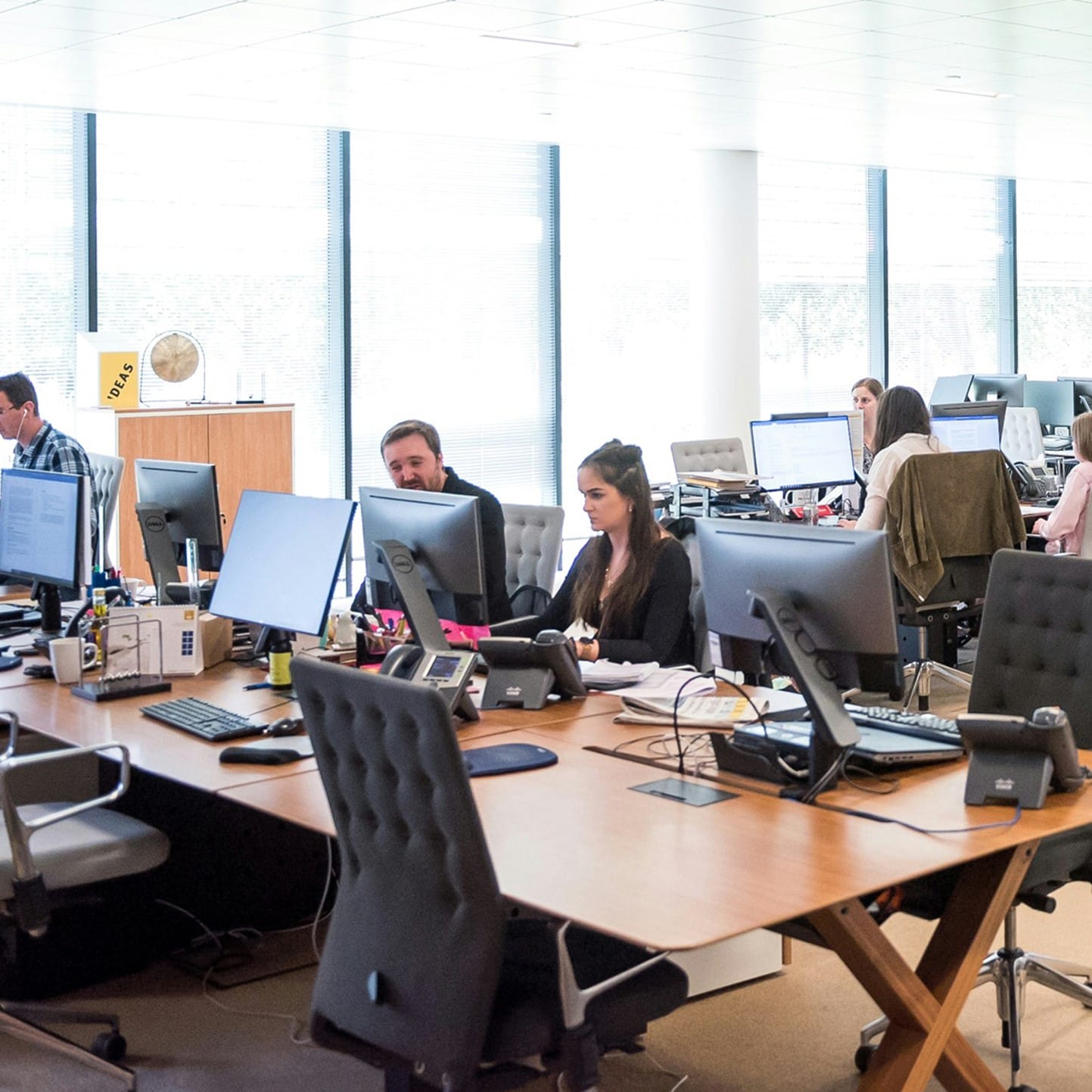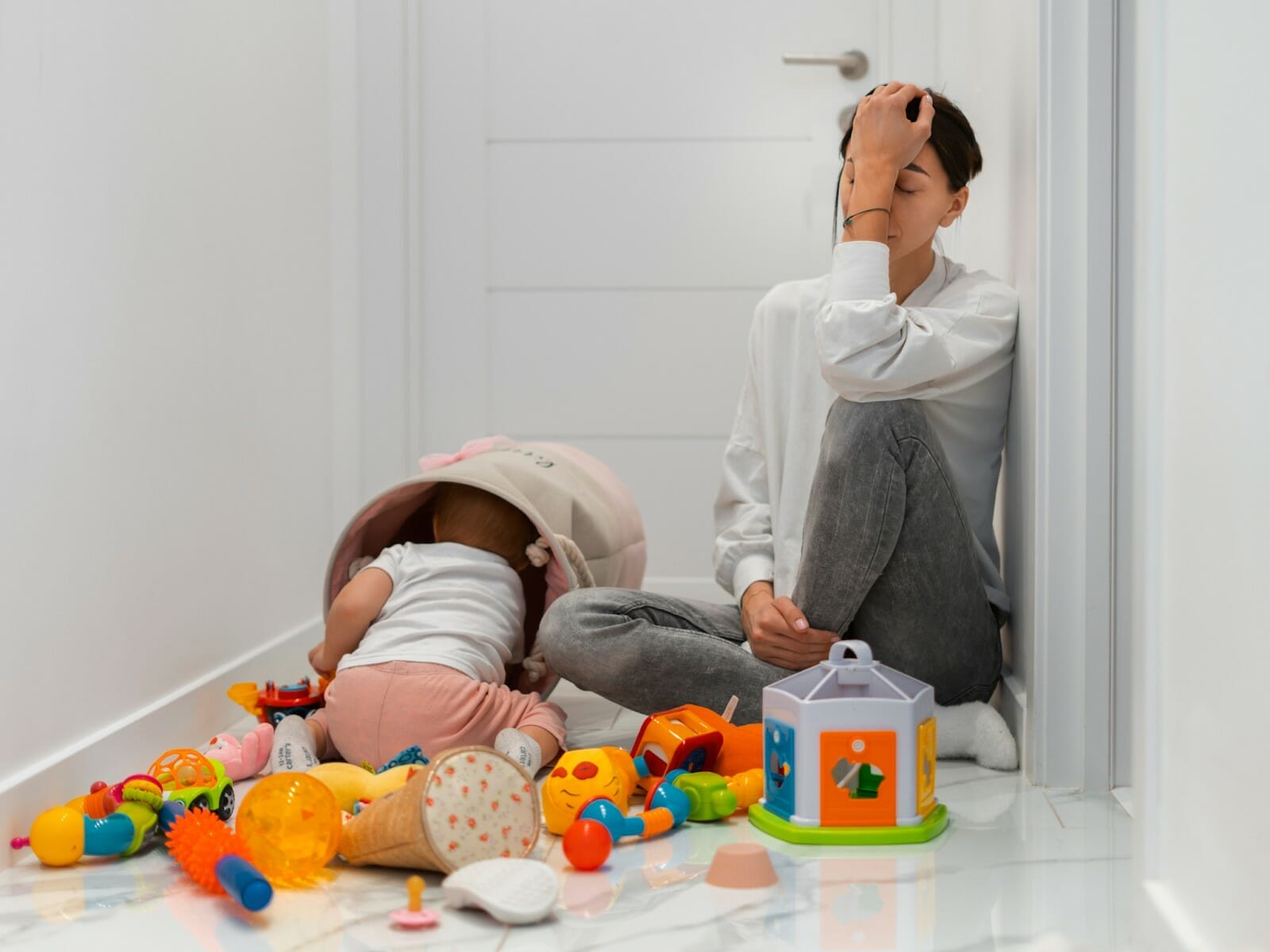We spend a big part of our lives at work. It’s where we talk with others, solve problems, and try our best to do a good job. But sometimes, people show up to work while quietly struggling inside. Behind smiles and small talk, many are dealing with stress, sadness, or feelings they don’t know how to share.
Mental health struggles are more common than most people realize. And when no one talks about them, the silence can be harmful.
This Mental Health Awareness Month, Bio-One of Fremont wants to talk about something that doesn’t get enough attention. We want to help more people understand how important it is to support mental health at work. Because when someone feels safe enough to open up, it might not just help them feel better. It could actually save their life.

Mental health challenges don’t stop when someone walks into work. If a person is feeling anxious, depressed, or overwhelmed at home, those feelings usually come with them to the office, the warehouse, or the job site.
Many people do their best to keep going. They show up, smile, and try to focus. But on the inside, they might be hurting. They could be dealing with grief, trauma, stress, or other serious mental health struggles, and no one around them even knows.
Why don’t more people speak up?
Because they’re afraid.
So instead, they stay silent. And that silence can make things worse.
At Bio-One, we’ve seen what happens when people suffer in silence. That’s why we believe it’s important to create spaces, especially at work, where people feel safe talking about what they’re going through.
It’s not always easy to tell when someone is having a hard time. At work, many people try to hide what they’re feeling so they can “push through” the day. But there are often small signs that can let us know when a coworker or friend might be struggling with their mental health.
Here are a few things to watch for:
These signs might not seem like much at first. But together, they can show that someone is not okay.
Even if you’re not sure, it’s always a good idea to check in. A simple “Hey, I noticed you’ve seemed a little off. Want to talk?” can let them know they’re not alone.
Sometimes, just being seen and heard can help someone take the next step toward getting support.

When people feel like they can't talk about their mental health, it can make everything worse. Silence often leads to shame. And shame can make someone feel even more alone.
At work, this silence can feel extra heavy. Someone might be struggling every day, but if they believe no one will understand or they’ll be judged, they may never speak up. Instead of asking for help, they keep everything inside.
That kind of isolation can be dangerous.
At Bio-One, we’ve responded to tragic calls where someone lost their life to suicide. It doesn’t just happen at home. We’ve been called to clean up offices, warehouses, and other workspaces where a person felt there was no way out.
Many of those lives might have been saved if they had felt safe enough to speak up.
This is why it matters to talk about mental health at work. Because when we make space for honest conversations, we make it easier for people to get the help they need, before it’s too late.
You don’t have to be a manager or part of the HR department to make a difference. Every person in a workplace can help create a space where mental health is talked about openly and kindly.
Here are some simple ways to start:
These small actions help build trust. And trust creates a workplace where people feel more supported, connected, and safe to be honest about what they need.

Leaders have a powerful role in shaping workplace culture. When managers talk openly about mental health and support their teams, it sends a clear message: it’s okay to speak up, and it’s okay to need help.
Here are a few ways leaders can make a real difference:
When leadership takes mental health seriously, it sets the tone for the entire workplace. It helps build a culture of care, and that can save lives.
Talking about mental health at work might seem small, but it can have a huge impact. It’s not just a kind thing to do. It’s a real form of suicide prevention.
When people feel like they can be honest about how they’re doing, they’re more likely to get the help they need. A caring conversation at work could be the moment that helps someone keep going.
Here’s what open, supportive workplaces can offer:
These things may seem simple, but they can make a life-changing difference.
Every conversation matters. Every person who chooses to listen, share, or care helps make the workplace a safer space for everyone.
At Bio-One of Fremont, we’re called in after some of life’s hardest moments. We clean up after tragedy, but we would much rather help prevent that tragedy from ever happening.
This Mental Health Awareness Month, we’re encouraging every workplace to take a step toward being more open, more caring, and more supportive. Whether you’re an employee, a manager, or a business owner, your words and actions matter.
One conversation can help someone feel seen.
One kind question can remind someone they are not alone.
And one safe space at work could be the reason someone chooses to stay.
Let’s work together to make sure no one suffers in silence.
Let’s make it easier to talk about mental health.
Let’s make our workplaces places where people feel supported every day.
Because sometimes, a simple conversation really can save a life.
Because many people are silently struggling, when mental health is ignored in the workplace, it can lead to isolation, shame, and even tragedy. Open conversations create safer, more supportive environments where people feel seen and are more likely to ask for help.
Look for changes such as:
Check in with them gently. Try saying, “Hey, I’ve noticed you don’t seem like yourself lately. Want to talk?” Just showing that you care can help them feel less alone.
Yes. Everyone can help create a more supportive workplace. You can lead by example, check in with others, and talk openly about your own stress or mental health experiences.
Many people are afraid of being judged, looking weak, or losing their job. That fear leads to silence, and silence can make mental health struggles worse.
Managers can:
Yes. When someone feels safe and supported, they are more likely to speak up and get help before reaching a crisis point. Honest conversations can be life-saving.
Silence can lead to shame and isolation. Bio-One has responded to suicide scenes in workplaces where people may have never felt safe enough to talk about what they were going through. That’s why early conversations matter.
Start small. Talk about stress, burnout, therapy, or self-care in everyday conversations. The more we speak openly, the less scary and “taboo” the topic becomes.
Ask someone how they’re really doing—and mean it. That one question could help them feel seen, heard, and valued. It’s a simple step that could make a big difference.
In challenging situations like biohazard cleanup or hoarding scenarios, understanding the costs involved is paramount. At Bio-One Fremont, we recognize the importance of transparency in pricing, and we're here to demystify our pricing structure for you.
A common query we receive over the phone is, "Can you tell me how much it will cost to…?" The truth is, every job location is unique in size, square footage, and degree of impact, making it difficult to provide a fixed cost upfront.
However, we are committed to providing clear answers to this question. Upon your request, Bio-One Fremont typically responds in under 60 minutes to your site to develop a detailed project plan and estimate – all at no charge to you.
Here's how we determine our pricing:
When you choose Bio-One Fremont, you can expect complete transparency and clarity in our pricing. We provide a detailed, line-item quote that comprehensively outlines our plan and associated costs. This empowers you to make informed decisions about our services with confidence.
Understanding that unforeseen expenses can be overwhelming, we offer financing options for every job. We firmly believe that everyone deserves access to the support they need without financial strain. Our financing options provide flexibility and peace of mind for our customers.
At Bio-One Fremont, our top priority is to deliver compassionate, professional, and effective services to our community. Our pricing structure reflects our unwavering commitment to providing high-quality results while ensuring transparency and affordability for our customers.
Should you have any further questions about our pricing or services, please don't hesitate to reach out. We're here to assist you every step of the way.


There are varied reasons people hang on to things they don’t need based on their circumstances or deeper-lying struggles. A cluttered home—even one that would qualify as a Level 5 situation—doesn’t stem from laziness or lack of willpower.
More often than not, a cluttered home is the result of a difficult-to-control situation, which is part of normal life.
What’s the source of your clutter? Following, are a few factors that may be contributing to your at-home clutter:

Having children can bring an abundance of joy, but also plenty of clutter.
Baby gear that is only used for a short period of time, rapidly changing clothes sizes, and piles of toys accumulate quickly.
It doesn’t end with the baby phase, though. As all guardians know, older kids and teens bring their own messes into the home.
Food-related messes combined with sleep deprivation can make it difficult to keep up with housework.
With children leaving clutter everywhere and food-related messes needing immediate care, it can be difficult to keep up with housework. Especially when you consider the sleep deprivation that also comes with kids.
Between art and science projects on the counter and smelly gym bags and laundry
left around the house, things can get (or stay!) messy.
It doesn’t help that children aren’t well-known for cleaning up after themselves!

As adults age, they may struggle to keep up with their housework.
Think of all the reaching and bending over. Consider all the hard scrubbing. With health issues, simple cleaning tasks take much longer to accomplish, if it can still be done.
Decreased mobility and increased health issues can make cleaning overwhelming or even impossible.
In addition, it can be difficult to let go of possessions accumulated over a lifetime.
Anxiety can make it difficult to throw away possessions.
People with anxiety may hold on to items in excess in case of a feared emergency or indecision about what to do with items.
Finding the motivation to clean and declutter is often a struggle for someone suffering from depression.
The stress of an out-of-control home situation (whether it’s actually out of control
or simply perceived to be) can create a negative feedback loop.
For example, maybe you’re struggling with depression and lack the motivation to do the dishes. This means the dishes quickly pile up and within a week or two every surface in your kitchen could be covered in dirty dishes.
Now, you’re facing an overwhelming mess that can make you feel even worse—piling on exhaustion, guilt, and shame—and making you even less likely to find the motivation to clean up.
This cycle can leave those struggling with depression feeling more overwhelmed and less able to approach their home situation.
Individuals with ADHD often have intense, passionate interests and may accumulate items related to that interest. In addition, it can be difficult for a person with ADHD to create and stay focused on a plan for a big cleaning project. Anytime there are multiple steps involved, it’s easy for people with ADHD to get distracted.
Obsessive-compulsive disorder is characterized by obsessive, intrusive thoughts and compulsive behaviors. People with OCD sometimes deal with anxieties and emergencies by compulsively buying items. They may have obsessions about running out of essential items or a buying ritual that is difficult to break out of.

Trauma can be a trigger for accumulating clutter. If someone grew up without:
They may feel driven to hold onto things rather than throw them away when they are no longer needed. Research shows that childhood emotional abuse and physical neglect in particular predict higher levels of hoarding symptoms.
People who have experienced loss may also accumulate possessions to soothe the ache of missing their loved one. Buying new things triggers a brief dopamine high, bringing temporary emotional relief.

If you grew up in a home where clutter was common, you are more likely to show these behaviors yourself. You may have a genetic disposition toward it through related diagnoses like anxiety or depression. You may also be more used to an environment where clutter, mess, and even the higher levels of hoarding are the norm.

No matter the reason clutter starts, it’s normal to feel overwhelmed and stressed by the situation. Home maintenance is a big task under any conditions. Certain factors can make the situation feel impossible such as:
Stress can lead to disorganized homes, and disorganized homes can increase stress. Natalie Christine Dattilo, PhD, clinical health psychologist and instructor of psychiatry at Harvard Medical School, calls it a chicken-or-egg dilemma.

“Recent studies have shown that clutter in our homes is associated with higher cortisol levels [our stress hormone], but it’s still unclear which comes first,” says Dattilo.
“Is it that when we are under stress, our ability to maintain a well-organized home becomes impaired? Or when our home is in disarray, does that make us feel more stressed, overwhelmed, and anxious?”
Regardless of the root of the issue, there is a way out. Resources are available to help you deal with your home situation. Bio-One can help! Our services can help ease your stress. For more information on how we can help you with your clutter call (925) 369-3096.

May is Mental Health Awareness Month, and following Bio-One's motto of "Help First. Business Second", it's important to us to recognize the impact that mental health has on our lives. Mental health affects how we think, feel, and behave, and it can impact every aspect of our lives, from our relationships to our work performance.
At Bio-One, we understand the importance of mental health and the toll that traumatic events can take on our emotional well-being. That's why we offer specialized cleaning services for situations where traumatic events have occurred, such as crime scenes or accidents. Our team is certified in Mental Health First Aid and trained to provide compassionate and professional cleaning services on a 24/7 basis while prioritizing the safety and well-being of our clients.
We also believe in promoting mental health and wellness in our communities. This month, we encourage everyone to prioritize their mental health and to seek support if they need it. We can all take steps to support mental health, whether it's practicing self-care, reaching out to a friend or loved one, or advocating for mental health awareness.
National Alliance on Mental Health (NAMI)
Together, we can work towards a society where mental health is prioritized and everyone has access to the support and resources they need to thrive. Let's use this month to raise awareness and show support for those who may be struggling with mental health challenges.
If you are experiencing a mental health crisis and need immediate assistance, please call "911" and explain the nature of your problem to the operator. The Mental Health Services Division (MHSD) administers a number of mental health programs for Children and Youth, Adults and Older Adults.
If you or someone you know may be considering suicide, contact the National Suicide Prevention Lifeline at 1-800-273-8255 (en español: 1-888-628-9454; deaf and hard of hearing: dial 711, then 1-800-273-8255) or the Crisis Text Line by texting HOME to 741741.

According to the American Psychiatric Association, suicide is the 10th leading cause of death in the United States and the second leading cause of death (after accidents) for people aged 10 to 34. And according the CDC, published reports from 2020 suggest that the pandemic has had a negative effect on children’s mental health.
“Beginning in April 2020, the proportion of children’s mental health–related ED visits among all pediatric ED visits increased and remained elevated through October. Compared with 2019, the proportion of mental health–related visits for children aged 5–11 and 12–17 years increased approximately 24%. and 31%, respectively.”
Researchers have yet to link recent suicides to the pandemic since 2020 suicide data is not yet available. But on the ground, there's growing concern.
The February 2021 NPR article “Child Psychiatrists Warn That The Pandemic May Be Driving Up Kids' Suicide Risk” explores possible correlation. Takeaways include:
For ways to help kids at risk, NPR encourages readers to read Part 2 of their story, “Make Space, Listen, Offer Hope: How To Help A Child At Risk Of Suicide”.
Suicide Prevention Resources
Survivors of Suicide – What to Do Next
The loss of a loved one by suicide can be a deeply painful and traumatizing experience; however, it’s important to know that everyone experiences suicide loss in their own way. As you begin the process of healing, consider reading the American Foundation for Suicide Prevention’s guide for to talk to others about what happened and identify ways to take care of yourself.
Additionally, if you have lost someone to suicide, there may be a cleanup required. There is no need for family or friends of the loved one to be further traumatized or overwhelmed with trying to figure out how to clean the impacted area. Bio-One is here for you. Learn more about Bio-One’s suicide remediation services.
If you or someone you know may be considering suicide, contact the National Suicide Prevention Lifeline at 1-800-273-8255 (en español: 1-888-628-9454; deaf and hard of hearing: dial 711, then 1-800-273-8255) or the Crisis Text Line by texting HOME to 741741.